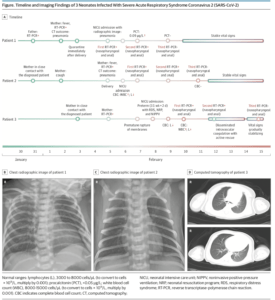Zeng et al., investigated neonates born to mothers with COVID19 recruited from Wuhan Children’s Hospital (Wuhan, China) (1). Consistent with previous studies, clinical symptoms from these neonates with or at risk of COVID-19 were mild with favourable outcomes. Of the 3 out of 33 neonates that had early-onset SARS-CoV-2 infection and symptomatic COVID-19, the most seriously ill neonate may have been symptomatic from prematurity, asphyxia, and sepsis, rather than SARS-CoV-2 infection. The authors suggest this because of strict infection control and prevention procedures implemented during the delivery, but it is still likely that the sources of SARS-CoV-2 in the neonates’ upper respiratory tracts or gastrointestinal tract (anus) were maternal in origin. Although 2 recent studies (2,3) have shown that there were no clinical findings or investigations suggestive of COVID-19 in neonates born to affected mothers, and all samples, including amniotic fluid, cord blood, and breast milk, were negative for SARS-CoV-2, the vertical maternal-fetal transmission cannot be ruled out in their current cohort. Zeng et al., suggest that it is crucial to screen pregnant women and implement strict infection control measures, quarantine of infected mothers, and close monitoring of neonates at risk of COVID-19.
References:
- Zeng et al., 2020. Neonatal Early-Onset Infection With SARS-CoV-2 in 33 Neonates Born to Mothers With COVID-19 in Wuhan, China. JAMA Pediatrics
- Zhu et al., Clinical analysis of 10 neonates born to mothers with 2019-nCoV pneumonia. Transl Pediatr
- Chen et al., 2020. Clinical characteristics and intrauterine vertical transmission potential of COVID-19 infection in nine pregnant women: a retrospective review of medical records. Lancet.
- Wei et al., 2020 . Novel coronavirus infection in hospitalized infants under 1 year of age in China. JAMA.
Article by Naffesa Al Sheikh











